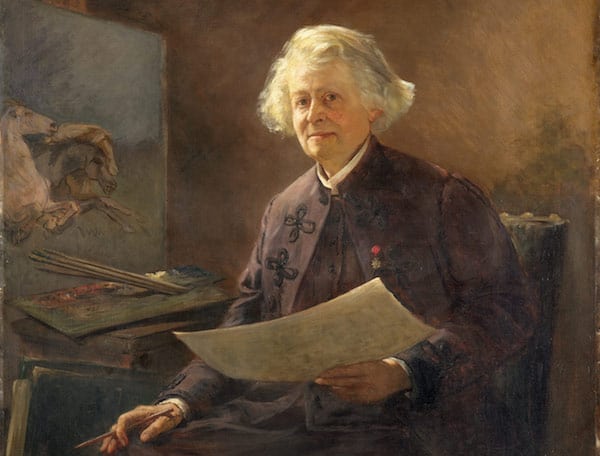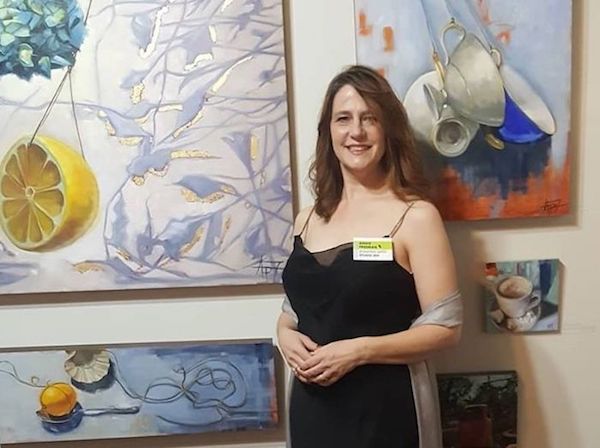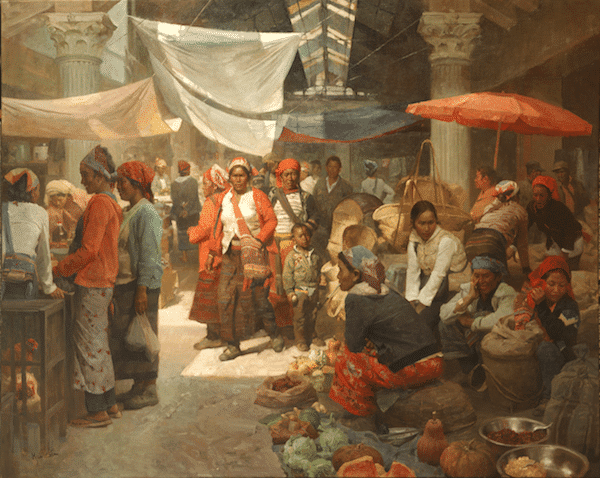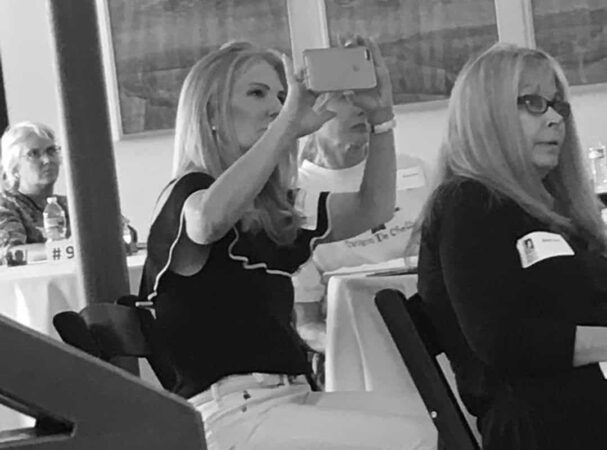Does talent matter? Should skilled artists go to the trouble of translating their “why” into a brand story, or even bother to focus on the business aspects of their studio practice? Isn’t the art work and the expression of your talent enough? How do artists in other disciplines navigate these questions in a way that’s relevant for visual artists? Daniel DiGriz is immersed in the culture of rock, and has a few takeaways for best business practices for fine artists…
Why do you think some artists resist the notion that art is a business?
DDG: I think it boils down to the same reason people who are in any other kind of business might cringe at the thought of doing sales. It’s a set of misconceptions about business (or sales) that threaten the purity of our self-image as professionals and our particular career paths. All you have to do is ask why people have resistance around it, and you’ll hear a litany of ideas about the sanctity of the creative process and the relative “dirt” of the commercial ecosystem.
Ironically, those incantations underscore a certain delicate notion of what it means to be creative. There’s actually a name for it—George Constanza (Seinfeld) called it “the fragile genius.” That’s comedy, but it’s not far off from observing that art is often represented as an incredibly vulnerable undertaking that can be disturbed, if not completely thrown off, by the things most regular people do every day. That concept of art as fragile rather than robust confuses me. Hemingway was both, you know. Van Gogh was both. Here’s a man painting at the window of his asylum. Amateurs act as if we can’t operate—can’t make art—unless all the conditions are right and nothing interferes. Professionals can make art in a hurricane. Just ask Jane Austen. She wrote those stories on her lap in the parlor, under everyone’s noses, pretending to write dignified correspondence, because of course ladies didn’t write bawdy fiction. I get it—I’ve talked myself into fragility too. But over time, if you’re going to get anywhere, you have to commit to the robustness of art, the resilience of art, the badass, tough-as-nails saltiness of art. It presents a wonderful challenge. I think everyone, even if they’re not a full-time artist, should at least once experience dancing on the deck of a ship in a stormy sea.
Well, artists depend on that commercial ecosystem, too. It’s not like you can completely reject it because of feeling too fragile!
DDG: You can reject it, if you’re engaged in art as a hobby and waiting for the day your art BECOMES art because it gets discovered. But that’s Horatio Alger thinking. You know, when I grew up, storylines were still heavily influenced by those penny novels that Alger made so popular: about a boy that pulls himself up by his bootstraps, and that’s still not quite enough—but doing so gets him “discovered” by a benefactor like Magwitch in Great Expectations. His genius is recognized. His hard work paid off. And now, courtesy of patronage, he’s granted a life of relative leisure doing what he feels he’d most like to do with his mind. It’s a pretty story. In A Bronx Tale, the main song “Streets of the Bronx” by Cool Change has the line, “Standing on the corner singing Doo-wop harmony/I’ve been waiting for the man to come along and discover me.” We’d all perhaps LIKE to believe in those stories. But for every one of those that actually happens, there are 1,000 successes that occur because someone built a business, marketed a great story, put in the work to acquire and nurture prolific relationships, and sold themselves.
The other way people reject the commercial ecosystem is by simply kicking the can down the road and offloading that work to someone else. I’m not saying there’s no role for agents, in art or in lots of industries, but middleman relationships have a price too. You’ve got a handler. You’ve got someone taking their cut of every pie. And if you’re kicking against the morality or ethics of business and selling, you haven’t avoided it. If I pay a guy to deal cocaine for me, I’m still a drug dealer, if we’re really going to say business is a dirty deed. I don’t think it is. Business, to me, is holy. In my world, the only ethical relationship is one predicated on the exchange of value for value, and that is quintessentially the premise of business and the nature of selling. Selling is making the argument for the value of whatever work you represent, be it your own or someone else’s. I’d challenge the best debater in the Oxford Union to talk me into the “dirtiness” of sales or business motifs. I’d sooner believe the earth is flat.
That really leaves the issue of whether you WANT to do it yourself or think you CAN. Wanting to is your business—to each their own. If you’re willing to pay what it takes, you don’t have to do it. But you’re just as commercial if you hire someone as you would be doing it yourself—let’s not play THAT game! What you give up is some control (just ask the rock stars who get pressured by their record labels), some cash (perhaps quite a lot over the course of your career, since it’s basically an unending subscription), and I suspect a lot of artists are giving up some business efficacy. Just because someone takes your money and says they’ll take it from here doesn’t mean they have the best ideas, are always on top of an evolving market, and are representing you as well as if you ran it. It’s why musicians often start their own labels. Creative control and business control are deeply interrelated. I think we forget that. It’s important and key.
If the issue is whether you CAN do it sometimes breaks down into two cognitive errors. We often think it’s an all or nothing proposition. If you do it yourself, does that mean you do ALL of it? Elizabeth Hulings is always pointing this out. The norm for artists as they scale their efforts is to start engaging people as contractors, assistants, etc. Artists are job creators. It’s something to be proud of. But ALSO, I see this mistake of thinking business is a talent. The other day I was talking with my music teacher about Eddie Van Halen. Eddie said to a reporter in a documentary (paraphrasing) “You seem to think we were born with guitars in our hands and knew how to make this music. It took a lot of WORK to get this sound, man.” “Yeah,” my teacher said, “I hate it when someone says I’m talented. I’ve put in countless, relentless, brutal hours of work to learn what I know. The idea that I was born with some facility that made it relatively easy is almost offensive.” The same things could be said about business or sales or any aspect of the commercial ecosystem. It’s learnable, in other words. Like any skill. It just takes study and work. To put another way, you make a study of it, and you work at it, and you get better over time. That’s how absolutely all of us do it. You show me a business person who woke up one day and could just do it, and I’ll show you someone whose product is a figment of your imagination. Those legends are why there was blind trust in an Elizabeth Holmes or a Bernie Madoff.
You’re a big fan of Steven Pressfield (Do the Work, The War of Art, and other books). What insights have you gained?
DDG: How much time do you have? But look, it’s not just Pressfield’s stuff that I value—I want to caution against finding the ultimate manual. I dig Pressfield, despite the evangelical thing, which I don’t really truck with. He’s that good, that I read past it and get to the ballsy, straight talk about getting what you want out of life. But in the same way, I’ve read Adam Smith, Thorstein Veblen, the early Christian Fathers, and Ayn Rand—to name a few. It’s not that these things congeal, cumulatively, into a worldview out of which I’m observing things about business. It’s something C.S. Lewis, the Anglican writer, called “the Tao.” Of course, he doesn’t use that term in the way a Taoist would. He’s reaching for a word to describe that which is universal that we find in all literary cultures. Specifically, he’s talking about ethics, and I love that, because I think that’s what’s missing from narrowly moral ideological systems. That principle I mentioned of “value for value” is part of the Tao. It’s one of those universal ethical principles that’s also a principle in Adam Smith, talking about the labor theory of value in his case for capitalism.
So that’s part of the context in which I’m reading Pressfield and thinking about what he’s saying. But channeling that into some insights, I find the stickiest are: 1) Resistance is a constant, though it constantly evolves; 2) You say you love me, or love you what do, so do your work, get off your butt and act like it; and 3) If this is not what you want to do, we’ll be able to tell, because you’ll do just about anything else except this—because that’s how resistance shows up.
I think the last two are fairly self-explanatory. The first one might require an observation or two. One of my favorite films is Leon, the Professional. And please, the international version, not the Bowdlerized one they showed in the US (The Professional). Leon’s neighbor, a little girl, has just been unreasonably berated and harshly slapped by her father, who is a drug dealer, who seems like he makes it a habit. She asks Leon, “Is life always this hard?” He says, “Yes. Always like this.” I love that. That’s the kind of Luc Besson, Studio Canal, French honesty that we need to hear more of. Not Disney’s “Anything is possible if you just believe.” The road to jobs people hate after high school is paved with kids who just believe. Instead of Leon’s tough truths, they’ve got people telling them they’re talented right up until the day no one grades for talent alone. Pressfield has a point about resistance being there at every mile marker, taking a different form, coming at us again and again, like ghosts in Scrooge’s bedroom. Sometimes they even appear in the form of best intentions and best practices. Essential things need doing, but the more things we deem essential, the fewer actually-essential things we can achieve. Perfectionism has very little to do with being perfect—when we give every detail equal weight, we fall out of rhythm and often end up back in resistance.
In the end, what you’re committed to is what you do. And if you’re committed to your deepest truth and vocation, everything will work to stop you. Forever. It’s always like this, so let’s stop using all our energy pushing back against it. What I love about that is someone finally said it.
You’re not saying that talent doesn’t exist, though, right?
DDG: In practical terms, I don’t think it matters whether it does matter or not. I want to address this aspect of talent: talent is cheap. There are countless talented musicians who don’t become famous. I know I’m in the minority view here. Someone famous said the undiscovered genius is a myth. Some people think the best of everything always gets discovered. Well, if it does, an awful lot of it gets kicked aside. But if, by discovered, we mean becomes generally known—oh hell no—I don’t think that. The rock stars of the 1950s through the 80s, after which I essentially stopped listening, weren’t necessarily the best musicians, or even the best showmen, or the best promoters, or the best at anything—even in combination. Don’t get me wrong. That IS music, to me. But take Scorpions, for instance. They kicked off in 1965 and finished their final farewell tour in 2016. They’re great. But even diehard fans would be hard pressed to say these are the most complex lyrics or musical compositions of the era, let alone of that glorious 51-year span. You know what they are? They’re the same thing AC/DC is. They’re awesome for the same reason. They’re WORKING musicians. They make WORKING music, and they WORK, and they put IN the work, and that work typifies the most common success stories.
Don’t believe me? We already cited Eddie Van Halen, in his own words, so how about The Beatles? Those guys didn’t emerge from some garage in Liverpool able to collaborate like that, with a sound like that, able to play completely in sync like that. For all that people enjoy sounding smart, and saying, “their songs weren’t all that complex,” I’d point out the best pop or rock songs never are. The Beatles honed their craft in hundreds of bars working gig after gig, sometimes thanklessly, for years, before the Not-So Easy Bake Oven timer dinged and they landed on Ed Sullivan. You try writing a song like “Hey Jude” and taking it to market. I would tell you I wish I could do it, but what I know is this: of course I could, and so could you—if we were willing to put in that kind of hard work. Talent is a word we use to excuse ourselves from doing OUR thing that requires hard work. I WOULD do it, we say, but I don’t have the talent. Talent grows on trees. I can throw a baseball off my fire escape and hit talent. This is New York, forgodsake. But I won’t hit a Beatle unless I throw it into a Liverpool bar on a Hard Day’s Night.
It might seem like I’m being contradictory, saying, “look, hard work alone doesn’t equal success” and “success is mostly hard work.” But let’s avoid the cognitive error of thinking in binaries. It’s hard work, but it’s not just one kind of work. The Beatles worked on composition, getting gigs, connecting with an audience, creating relationships, collaboration, production values, recruiting, recording, auditioning…they did the work. And that’s a clarion call for each of us to do the work. Stop making excuses and do the work. The work is all of it. If it were just songwriting, or just plucking chords, most of us would be rockstar-famous and obscurity would be the weird exception.
To quote Joe Strummer (the Clash), “I’ll tell you what it is. We try harder. That’s all it is. We’re not particularly talented.”
This can be supremely comforting, you know. If we set aside the question of talent, and the excuses that go with it, we also jettison the questions it prompts, “am I talented enough?” If you’re not willing to let go of other possible dreams, and you aren’t ready to walk over hot coals to get to your art, then you might be in the wrong line of work. Or else you’re not going to be a full-time working artist. It’s not wrong to dabble in art, or do it part time. Art belongs to all of us, as a craft, and it’s also there for us as consumers and collectors. I think so many of us have MULTIPLE art forms we do in the same way aficionados might fish, play tennis, or play chess. More than a hobby, less than the all-consuming career path. But your central vocation is non-negotiable.
So does it even matter if you’re talented? Would you quit if you couldn’t find a test somewhere that measures or confirms “talent,” or if someone tells you they don’t think you’ve got the right stuff? Of course not—not if you’re doing this for real. One of those musicians from the era I mentioned said in a Rolling Stone interview, “People think I’m this way because I’m in rock and roll. No, I’m in rock and roll because I’m this way.” Yeah. I live that every day, in my own vocation. We all do, if we’re true to it.
You teach Brand Story in CHF Conferences and the Digital Campus. Do you think one of the reasons not everyone gets “discovered” is they don’t have a compelling story?
Short answer: Yeah. I liked Keebler and Dolly Madison, growing up. The kids at school liked Nabisco and Hostess. This is back before we knew about preservatives, and before “craft” became an adjective.( I lived in suburban Hell, so no fresh-baked French pastries for me!) But look, it wasn’t just that Keebler showed up on my favorite cartoons, and Dolly Madison was the copilot for every Peanuts special, though that didn’t hurt. I think they were more like Entenmann’s, and their competitors were more cardboard and glue. It’s a matter of palate, of course. But a lot of brands like that just didn’t make it as big. Royal Crown Cola couldn’t knock down Pepsi which was getting its butt handed to it by Coke. I don’t think it’s that more people liked the product or liked the taste. If it was about taste, you’d just eat or drink something else. Taste is the equivalent of talent. I think the reason one brand of flour, cocoa, maple syrup, or cereal made it—and the other is a scarce vintage item—is because one brand told a better story.
Coke made itself the American beverage; go back and watch the advertising. Better yet, check out the example of Marlboro’s branding. Winston is arguably the better cigarette. Smoking, like eating McDonald’s, is something I haven’t done since before I was twenty, but partly because I’m a Mad Men fan, I’m still thinking about where cigarettes land in commercial culture. Fred Flintstone and Barney Rubble smoked a pack of Winstons on TV. Really! I started when I was fifteen, and nobody I knew smoked Winstons. Marlboro, with that cowboy on the range, the rugged individualist, was part of the better story. Winston couldn’t compete. I choose that example because it’s unforgettable, isn’t it? If you haven’t SEEN that billboard, you don’t have a US passport.
So, are you saying even with all the hard work (of all the different kinds) needed to succeed, you won’t succeed without a compelling brand story?
DDG: Technically I’d say this is a false dichotomy. The brand story is PART of the work. Do the Work, to refer back to Pressfield’s book by that name. I’m not saying Post or Pepsi, Quaker and General Mills didn’t have a compelling story. Just that some of their products lost out to brands with MORE compelling ones—meaning stories so compelling that, if both drinks are on the soda fountain, you’re going to run out of one faster than the other. When I sold cigarettes, you couldn’t keep Marlboros in stock. The most dangerous customers weren’t hold-up men; they were 6 AM, just-got-off-work Marlboro smokers who heard the words, “we’re out of soft pack 100s. We got shorties in a box.” Fortunately, I could wield a roll of Hostess doughnuts in a pinch.
This is what I think people need to acknowledge, accept, and truly take to heart: art is a competitive market. The analogy with cigarettes and soft drinks is fair. If we’re caught up in the view that we have talent, and no one has our particular talent, and talent counts for all, then competition is an illusion, we don’t need to strategize around it, and it doesn’t matter. If, however, success is about work, and about doing the various KINDS of work necessary to build a full-on thriving business, which is what a self-employed art practice is, then competition is legitimate.
Think of it like this: there’s only so much attention and time people are going to devote to the observation and acquisition of art. I’m sure all of us have had a friend suggest a book and you had to say, “look, I have a long reading list. I’m sure the latest book on this political issue is fierce, but I’ve got to make calculated choices with my limited time, so I might pick it up one day, but for now, it’ll just sit there.” If you’ve ever even thought something like that, with any number of shows, movies, or other recommendations, you’re dealing with a reality that applies—like it or not—to your art. “Should” and “ought” don’t factor in. This is how we are. And if that’s the case, you’re ALWAYS competing for people’s time and attention. You’re competing to be heard, noticed, and not filtered out. You’re competing to rise as a signal above the noise.
I saw a documentary that made a sad point: Men at Work, such a great 80s band, would have been huge were it not for The Police. They were both cockney, and both lead singers even sort of looked alike. Men at Work got tagged as “the poor man’s Police.” They never achieved the commercial fame Sting and the others did. Same deal: The Alarm vs. The Clash. I think neither was more talented. I think both told good stories. I think one set of stories connected more firmly with an audience, and it made a difference. I think neither quit because of that, and that’s encouraging. I think both are essential, and I’m glad to have heard both. There’s a place for your art, if you do the work. If you don’t, there’s nothing to complain about.
Aren’t There Artists Who Didn’t Have a Brand Story per se?
DDG: If you’ve got no story, you’re generic. There are lots of generic artists. I’m going to use rock music as an example again. If a band is happy playing clubs and being on movie soundtracks, no problem. There are an infinite number of Singer-Songwriters. You trip over them trying to walk through Brooklyn. Stadium rock: there are a couple of those bands we probably each like. It’s a sound, and anyone can make that sound. It’s off-the-rack, and off-the-rack is fine. When I go to the Adirondacks I’m wearing off-the-rack clothes with a brand story that defines my purpose in the wilderness. Of course, I mean Patagonia. A Target brand flannel is just not going to cut it. It’s not just the story, but the story is how I know that the product is what I’m after. It’s an INTERACTION between me and the product’s creator. It’s not just about product features, and not just about emotions and aspiration—it’s both. It’s not just that the art is pretty, or I like the look—it’s that, AND it’s the answer to the question, “What else is cool about this?”
I know there are reasons why some people don’t believe the argument I just layed out. Not the least of which is there are at least some art buyers that wouldn’t recognize the difference between an Entenmann’s and a fresh-baked French pastry. It’s fine that those people buy art, too. But I think the most common reasons ARTISTS don’t think this way is either: a) they haven’t been exposed to these ideas in this way; b) the force of tradition is strong, and tradition says the artist lives in a Horatio Alger story; and finally, c) excuses, which is the way Pressfield thinks about not doing the work. We often don’t accept things when we have a financial or vested interest in not accepting them, when they support our existing ideas (perhaps stoked by the inertia of traditional thinking), and when it would be a lot more work for us to accept them.
Would you say that a Brand Story is a lot of work?
DDG: No. And yes. It’s something you’ll tinker with and refine until you die or get rich, whichever comes first. We can’t say it’s not work—but it’s also good work that we can enjoy. Is expressing yourself work? A brand story is relatively simple in format. The simplest form is problem/solution. We do it every day. “Honey, I lost my keys.” “Where’s the last place you used them?” Problem/Solution. (I know, I know…most of us would counter that solution with: “If I knew that, they wouldn’t be lost, would they?” I acknowledge it’s not necessarily easy to figure out what problem you should be solving.) The easy part is that we can probably come up with some version of a brand story quickly, and we can relax because we know we’re going to be tweaking it off and on for years—and so is everyone else who’s doing it. That’s true even if they don’t know that a long term, iterative process will be the reality.
Plenty of rock musicians didn’t KNOW what story they were telling, or how it was coming together, but they were willing to talk to reporters about what they were thinking, and it became a problem/solution dialogue. Just watch old footage of reporters asking Joe Strummer (of The Clash) questions. He evades, mocks, changes the subject, but there’s a story coming out, and eventually it’s loud and clear. You can hear the problem/solution thing. We’re doing this because of that, or we’re doing this and rejecting that, because of the other thing. The quintessential Punk story was that there are already enough boy-meets-girl stories, so they talked about other things going on in the world that affect people profoundly. And so a generation of music speaking to poverty, exploitation, and hypocrisy was born. Joe Strummer put it this way to Tom Synder, “Maybe too many songs have been written about love already. So, subject covered.” Pete Seger must have been proud.
If I were to offer one piece of advice to an artist who doesn’t know what their brand story is, isn’t even completely sure what a brand story means, or why they might want one, and who doesn’t yet have a plan for what they’re going to do about their brand story, it’s this: the most important thing you can do is talk about why you’re doing what you’re doing. Your words are part of the art. I don’t accept the idea that an oil painting on a sterile wall behind a glass security case with no context is art. I don’t think what runway models wear that never hits the stores, and that isn’t practical to make or to wear, is really clothing. I don’t think a $75 million dollar cake made with gold flakes which has its own security detail is food. The art has to come out of the case sometimes and be touched, hang on the wall of a great room or a grass hut, and someone needs to talk about why it exists. I don’t accept that visual art is it’s own self-contained commentary, because then a machine could make it, and we’d be missing the beauty of human authorship. When we act as if the art is self-contained; then the artist doesn’t count. It’s like some collectible figurine we buy on Ebay, still in the original shrinkwrap, and we never take it out and play with it. GI Joe needs to swim. R2D2 needs to go on a mission. A painting is PART of the artist’s conversation with the world. If it’s not so, an artist is just a factory technician, and we needn’t ever know or even care about their name. If we sign art, we’re saying there’s a human being, and human beings are made out of “why.” Just because we may not (yet) be able to answer that question in a casual ten seconds, doesn’t make it untrue. It takes work to get to that point. Meanwhile, we just do our best.
Tom Snyder asked Joe Strummer, “why do you sell your records at discount prices?” Joe answered, “because we know one day we’ll return and be nothing again.” In another interview, The Clash pointed out that everyone they knew were on the dole. The choices they had with no jobs were to go on the dole or make music. If the people they knew all had jobs, maybe they’d write love songs. But since they don’t, they made songs about what was going on. The boys bleed their story, even if it leaks out just in such snippets and sound bytes.
For more comments by Strummer on what The Clash was trying to do with their art, this video is interesting. Short version: “I don’t like music at all. Music isn’t the point. I can play all six strings or none.”
Thank you Daniel!







